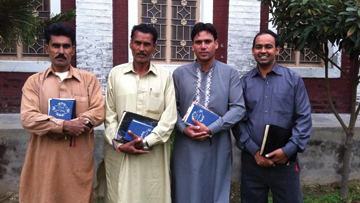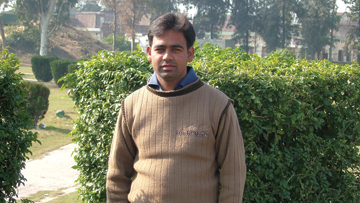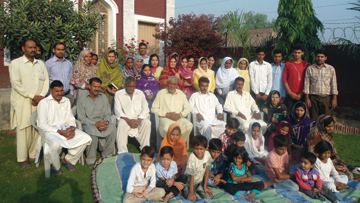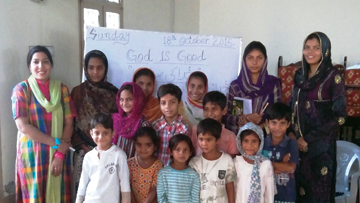You have free articles remaining this month.
Subscribe to the RP Witness for full access to new articles and the complete archives.
In Pakistan, “Christian” is a stamp on the passports. Christian children born to Christians in Pakistan are legally segregated at birth into the Christian minority class to face social, economic, and legal restrictions as Christians.
After Muslim-majority Pakistan was partitioned from Hindu-majority India in 1947, the nation pursued secular policies and jurisprudence. But in 1956 Pakistan officially became The Islamic Republic of Pakistan, and Pakistani sharia law has since been expanded by successive governments. These blatantly Islamic laws discriminate against Christians and present Christian young people a one-way street out of Christianity into Islam (with all the social benefits of that decision).
This legal reality means that, in Pakistan, “Christian” is merely a legal word—not a gospel word—for the masses. It also means that, in the eyes of the government, nominalism, traditionalism, and Christian cults (all inconsistent with the Scriptures) are regarded as Christianity.
The result is that, for many generations, Pakistani Christians have tended toward formalism or superstition devoid of the gospel of Christ. But the good news is that many younger Pakistanis are learning to know and love and serve Jesus Christ Himself and seek biblically informed foundations for their faith. Many churches are being planted. By God’s grace, reformation is coming—and will come—to Christ’s church in Pakistan.
A Practical Reformation
Around the world, believers are learning to pray for reformation in Pakistan. But true reformation requires not merely a few missionaries or political change. It requires the work of Christ Himself effectually calling His chosen people out of darkness and uniting them together in His visible church to grow through the means of grace.
Practical reformation of the country will include the reintroduction to individuals and a hostile culture of “the faith once for all delivered to the saints” (Jude 1:3). It will entail individual conversions leading to a Christ-centered orientation of life, including family and church worship, daily spiritual disciplines, regular catechism, and biblical evangelism.
This personal piety will overflow into reinvigorated churches that study the Word together, hear Scripture-based (exegetical) sermons, rightly administer the sacraments, and exercise biblically mandated church discipline. Such reformation (or perhaps formation) in Pakistan has been a long time coming.
A Long Time Coming
India (which included Pakistan until 1947) is mentioned in the Bible in connection with the rule of Ahasuerus (Esther 1:1; 8:9). According to Eusebius’s Church History (3.1; 5.10), Thomas and Bartholomew were assigned to bring the gospel to Parthia (modern Iran) and India.By the time of the establishment of the Second Persian Empire (a.d. 226), churches were established in northwest India, Afghanistan, and Baluchistan (now a southern province of Pakistan). Many Pakistani Christians trace their roots to 19th Century British and American missionaries.
The Associate Reformed Presbyterian Church in Pakistan was established in 1911.
From 1947 to the mid-1970s, the governments of Pakistan pursued a largely secular agenda. In 1971, “East Pakistan” gained independence from Pakistan and became the country of Bangladesh. The majority of Pakistan’s Hindus, who lived in Bangladesh, no longer balanced Pakistan’s Muslim majority. Pakistan became a culturally monolithic, increasingly Islamic state with its smaller religious minorities facing ever-increasing hostility. The nation became more aggressively Islamic in 1973, when Islam became the source of legislation and a cornerstone of national identity. Meager lip service was given to freedom of religion and equal rights for religious minorities.
Today, Christians make up the largest religious minority in Pakistan, with an estimated 2.5 million adherents (in 2005), or 1.6 percent of the population. Half of these are Catholic and half are Protestant.
In the province of Punjab, over 2 percent of the population are registered as Christians. In the Islamabad Capital Territory, 4.7 percent are identified as Christians. The Christian minority has contributed in many ways to Pakistani national life as educators, doctors, lawyers, and businessmen.
The Blasphemy Law
Pakistan’s dreaded blasphemy law is found in the Pakistan Penal Code 295-C. Perhaps more than in any other Isalmic nation, this law has emboldened fundamentalist and religious political parties to act out their anger against minorities—especially Christians.
This law is employed to settle personal scores or force conversions, to take over the land and businesses of Christians, and to silence the preaching of Christian faith. These laws have proved a potent weapon for religious persecution by extremists, with active encouragement from the government. Those accused of blasphemy over the years come from these districts in the state of Punjab: Faisalabad, Gujranwala (where Chaura RP Preaching Station is located), Toba Tek Singh, Jhang, Sialkot and Sargodha.
Chaura RC to Chaura RP
In the small village of 4,000 northeast of the city of Gujranwala is Chaura, a place with organic connections to the RPCNA.
A church was founded approximately 150 years ago in Chaura as a nominally Roman Catholic church. When Eliah’s great-grandfather moved to Chaura as a young boy, his family began to worship at the newly established Roman Catholic church in town. Almost a century later, Eliah’s mother brought the first Protestant Bible to Chaura in 1966.
Eliah was born in 1973 and has memories of attending this church occasionally. Attendance was poor. Prayers to Mary using the rosary were common. Statues of Mary, the crucifix, and many saints adorned the building as well as many “Christian” homes. Priests would occasionally visit and perform the eucharist, but Eliah does not recall hearing the gospel in that church even once.
However, by God’s grace, on the first Lord’s Day of January 2005, Eliah (by now a seminary student at Kukje Theological Seminary in South Korea) was allowed to preach the truth of Christ in Chaura Roman Catholic Church. People’s hearts were convicted, and over time many families (especially young people) put away their idols and began to study the Word of God.
Ten years later, God’s living Word is proclaimed through discipleship seminars, which have brought ongoing reformation in this tiny, remote village and several surrounding regions. Under the oversight of the Midwest Presbytery (RPCNA), Chaura was established as an RP Preaching Station on Jan. 17, 2015. As a part of this process, four ruling elders were elected by the congregation and were then trained in the Scriptures over seven months. Currently, the church has a functioning session that meets monthly and regularly visits the families of the church. The elders participate in the church’s teaching ministry and arrange for regular supply preaching. They oversee the church’s receipts from weekly giving and budget for the church’s finances.
Currently, the congregation does not participate in the sacraments, but members are eagerly waiting on the Lord to provide all that is necessary for regular baptisms and for the serving of the Lord’s supper by ordained ministers of the gospel. Local elders are training local families in the covenant of communicant membership. RP Global Missions is formulating plans for representatives to visit and, Lord willing, to organize the congregation as the first RP mission church in Pakistan in spring 2016. Confessing Biblical Faith
An important part of unified witness in Pakistan is the church learning to confess together the great truths of the Christian faith. Eliah learned this important principle during his studies in South Korea. He learned the importance of systematic theology and of the rich history of biblical interpretation flowing from the Protestant Reformation.
In 2007 he translated the Westminster Shorter Catechism into Urdu (the national language of Pakistan). Later that year he published 1,000 booklets of it through a Muslim printer in Lahore. These catechisms were warmly received, and, though multiple print runs were made, this catechism is currently out of print.
Perhaps even more strategically, in 2012 Eliah began a systematic search for the Westminster Confession of Faith in Urdu. To the surprise of many inside and outside of Pakistan, no translation could be found. Thus in 2014-’15 Eliah completed the first draft translation of this document in the history of his country. It is currently being reviewed and is scheduled to be published in Pakistan in 2016. The Confession was translated chapter by chapter for use in weekly discipleship times with the ruling elders being trained at Chaura church.
Singing God’s Songs
In the providence of God, a Sikh convert to Christianity radically affected the Christian landscape of Pakistan by making a metrical translation of the Book of Psalms. Imam Din Shabaz (1845-1921) became a pastor and completed translating and setting to music all 150 psalms. These psalms have been sung throughout churches of all denominations in Pakistan for more than a century. With the recent rise of Pentecostalism, these psalms are being forgotten or regarded as old fashioned, and there is a great need for a younger generation to understand and demonstrate the beauty and glory of singing God’s Word.
Chaura RP is the only known body of believers in Pakistan where exclusive psalmody is practiced. We pray that God will enable His people to plant more RP congregations and invite other Bible-based churches to join their voices together in Scripture-based unity to the glory of Christ in the Islamic Republic of Pakistan.
Training Elders Who Rule
Though there are many Presbyterians in Pakistan, the rigorous training received by the four ruling elders of the Chaura church not common. According to Pakistani observers there is a notable weakness in the biblical standards and training of elders, who are often illiterate. Thus, a current practice of our mission work is the emphasis on a confessionally trained eldership.
Through a program of weekly discipleship the elders have learned to bring the Word of God and the church’s confession to bear on the practical questions and problems faced in the life of the church. As they are trained in materials such as Jack Kinneer’s How to Grow in Christ and the church information booklet, they are assigned to in turn teach that material to the members of the Chaura congregation in a variety of settings.
Growing Covenant Children
In Chaura, village reformation is beginning as the church learns to disciple its children in the ways of God. Though no infant baptisms have yet taken place, Sabbath school classes are held regularly, and children are learning the joy of knowing Christ by the Scriptures. There are two Sunday school teachers appointed by the elders.
Eliah noted that in his lifetime and in his father’s lifetime, no Sunday school classes had been taught. But as the congregation learns more about the Reformation doctrine of the church, much more attention is being focused upon training up godly, covenant children.
Pray for Our Future
Biblical mission work takes God’s people to the front lines of Christian ministry. People in Pakistan, including many nominal Christians, are largely unreached by the biblical gospel, and there are many pressures upon the church. Pray for those involved in this endeavor to be effective, that their personal relationship with God will bear much fruit, that they might grow in the grace and knowledge of Christ. In many areas the work of this mission is being challenged by Satan. Pray for God’s protection and that his saints might persevere in the face of many acute afflictions. Let us be “strong and courageous” (Josh. 1) and look to Christ who has overcome the world.
May the Lord use the Reformed Presbyterian Church of North America to bring the clear vision of the Reformed faith to the nation of Pakistan—for His glory!
For more context on mission efforts in Pakistan, see worship.calvin.edu/resources/resource-library/more-context-on-christians-in-pakistan/
Brad Johnston is the pastor of Topeka, Kan., RPC. Eliah Massey is commissioned by the Midwest Presbytery as a missionary to Pakistan.



